Can a nutrient deficiency really cause acne? Acne is a super common skin condition that affects millions of individuals worldwide. While many factors contribute to the development of acne, one often overlooked aspect is the role of nutrient deficiencies. Proper nutrition plays a crucial role in maintaining healthy skin, and nutrient deficiencies in certain nutrients can exacerbate acne symptoms. So while hormonal imbalances, bacteria levels and inflammation are the made drivers of acne, we need to think about what nutrients help to create healthy hormones and support the immune system to reduce inflammation.
1) Essential Fatty Acids (EFA’s)
Essential fatty acids, particularly omega-3 and omega-6, are vital for maintaining healthy skin. They help regulate inflammation, skin cell turnover, and sebum production. They’re also key for supporting a healthy skin barrier, acting as the glue that hold our skin cells together and prevent water loss from the skin. Deficiencies in EFA’s can lead to increased inflammation, slow shedding of skin cells, and sebum production, contributing to blocked pores and acne formation.
Signs and Symptoms of Deficiency:
- Dry, flaky skin
- Dry eyes
- Inflammation and redness
- Mood changes
- Joint pain
- Increased frequency and severity of acne breakouts
Causes for Low Levels:
- A diet lacking in sources of healthy fats like fish, nuts, and seeds
- Gut issues that cause fat malabsorption (such as SIBO)
2) Magnesium
Magnesium has so many functions in our bodies, it helps to create hormones, support our mood, create energy and help with bowel movements. Deficiencies in magnesium can be common because our lives are pretty hectic and stressful, which drains our magnesium stores. As well, our soils are depleted from the way we farm; meaning that magnesium levels are lower in fruits, vegetables and legumes than they used to be. This is a common nutrient deficiency I see in acne – I think because having acne itself causes so much stress for the individual.
Signs and Symptoms of Deficiency:
- Muscle cramps
- Increased anxiety
- Palpitations
- Hormonal imbalances
Causes for Low Levels:
- Inadequate dietary intake of magnesium-rich foods like leafy greens, nuts, and whole grains
- Certain medications, such as diuretics, can deplete magnesium levels
- Poorly controlled diabetes
- Excessive intake of alcohol
- Severe or chronic diarrhoea
- Chronic stress
3) Zinc
Zinc is essential for immune function and skin healing, and low levels of zinc can affect how well our immune system functions, which might increase the susceptibility to infections. It also helps control the production of androgens (hormones such as testosterone), which can influence the severity of acne. Zinc is another extremely common deficiency I see in people with acne, and it can be due to gut issues, which really affect the absorption of this mineral.
Signs and Symptoms of Deficiency:
- Delayed wound healing
- Weakened immune system, or frequent infections
- Weak, brittle nails
- Skin issues, such as rashes, eczema and acne
- Feeling tired
- Digestive issues
- Loss of taste or smell
Causes for Low Levels:
- Inadequate intake of zinc-rich foods like meat, shellfish, and seeds such as pumpkin seeds
- Malabsorption issues related to gut health problems
4) Iron
Iron is crucial for oxygen transport in the blood and supporting the function of cells. Low iron levels can lead to poor circulation and inadequate oxygen supply to the skin, impairing its ability to repair and maintain itself. I always recommend testing iron and ferritin levels before supplementing because too much iron can start to contribute to inflammation within the body.
Signs and Symptoms of Deficiency:
- Pale skin
- Fatigue and weakness
- Slow wound healing
- Increased susceptibility to infections
- Hair thinning
- Shortness of breath
Causes for Low Levels:
- Inadequate dietary intake of iron-rich foods like liver, red meat, and beans
- Blood loss due to menstruation or other medical conditions
- Malabsorption issues in the gut
- Pregnancy & breastfeeding increase the body’s demand for iron
5) B Vitamins
The main b vitamins you’ll be able to test via a blood test include folate (B9) and B12 – and these are the most common ones we see deficiencies in. Each of these vitamins play an essential role in skin health and overall well-being through various functions. They are involved in energy production, hormone regulation, oxygenation and circulation – all of which can affect our skin. Each b vitamin will cause slightly different symptoms if you’re low, but generally the symptoms are the following.
Signs and Symptoms of Deficiency:
- Dermatitis or skin rashes
- Fatigue and weakness
- Headaches
- Palpitations
- Shortness of breath
- Numbness or tingling in hands and feet
- Sore mouth or tongue
- Anaemia
Causes for Low Levels:
- Poor diet lacking in B vitamin-rich foods like meat, fish, and leafy greens
- Alcohol consumption can deplete B vitamin levels
- Malabsorption issues due to gut health problems
- Genetic variations can increase the demand an individual has for folate and B12
6) Vitamin A
Vitamin A is crucial for skin cell turnover, reducing sebum production, and supporting the immune system. It’s important to note that too much vitamin A can be toxic, so you really need to get the balance right when supplementing with this nutrient. This vitamin is often recommended to people with acne, and although it is important, taking a high dose of vitamin A won’t solve all your problems.
Signs and Symptoms of Deficiency:
- Dry, rough skin
- Dry eyes
- Increased susceptibility to infections
- Poor wound healing
- Acne and breakouts
- Night blindness and vision problems
Causes for Low Levels:
- Inadequate intake of Vitamin A-rich foods like liver, eggs, and sweet potatoes
- Poor fat absorption due to gut issues (IBD, IBS, Coeliac disease)
- Low intake of co-factors for absorption, such as healthy fats, zinc and iron
- Excessive alcohol intake, which can deplete Vitamin A levels
- Genetic variations can affect how well an individual can convert carotenoids from plants into active vitamin A
A note about Vitamin A: It cannot be taken as a supplement during, or shortly after Roaccutane treatment. If you have had Accutane in the past and still struggle with acne, a vitamin A deficiency is not the issue.
7) Vitamin D
Vitamin D is crucial for immune regulation, and I always test this in clinic. If your vitamin D levels are low it could really impact how well your body is regulating inflammation, or how well it fights off bacteria – both of which are really important in clearing your skin for good.
Signs and Symptoms of Deficiency:
- Fatigue and weakness
- Bone and muscle pain
- Inflammatory skin conditions
- Weakened immune and increased infections
Causes for Low Levels:
- Inadequate sun exposure, particularly in regions with limited sunlight
- People with darker skin tones need more prolonged sun exposure to create enough vitamin D
- Genetic variations can affect how well an individual can synthesise vitamin D
Before you order acne-clearing supplements…
So yes, we have discussed that a nutrient deficiency can cause acne, but before you buy supplements to help clear acne we need to address a few things. As you can see, a lot of the symptoms of different deficiencies overlap. You could feel tired, but fatigue can be related to low b vitamins, low iron and low magnesium – so which one do you supplement with? All of them? Don’t buy any supplements before doing the following:
Testing for Nutrient Deficiencies
Getting the balance of nutrients correct is essential. If we take too much, it can have negative side effects, and if we take too little – it won’t have any impact at all. The way to know how much you need, is through testing to see what your levels of nutrients are. The other thing to note is that nutrients interact with each other, and using something like zinc long-term can start to deplete copper levels, which causes other health issues.
make sure you’re eating your nutrients
These nutrients all need to be coming into your body through food first. Incorporating a balanced diet rich in essential nutrients is essential for maintaining healthy skin and preventing acne. Deficiencies in EFA’s, Magnesium, Zinc, Iron, B Vitamins, Vitamin A, Vitamin D, and Vitamin C can all impact skin health, leading to increased inflammation, sebum production, and acne breakouts.
work out what’s causing the deficiencies
There are a lot of reasons why you might develop a nutrient deficiency, and we need to know why it’s happened. Supplementing with iron all the time helps to reduce the symptoms of low iron levels – but why are you iron levels always low? Why can’t you maintain them? Is it because you don’t eat iron-rich foods? Have heavy periods (if so, why do you have such heavy periods)? Do you have optimal stomach acid to help with the absorption of iron? Is there a genetic issue? We have to find out why.
Remember, a holistic approach to skincare and nutrition is key to achieving and maintaining a radiant, blemish-free complexion. And if you’re ready to test for nutrient deficiencies, drop me a message to we can get started on your clear skin journey.





0 Comments